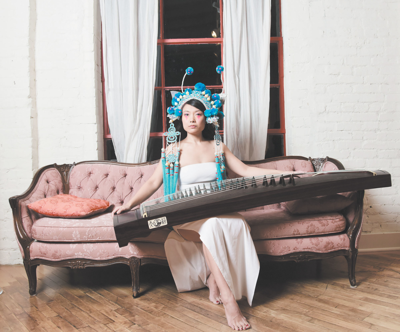
Wu Fei
Classical requiems are typically solemn affairs, musical works most often associated with death and mourning. But in the hands of Nashville-based composer Wu Fei, this darkest of forms has been transformed into a multicultural song of life and hope.
That, at least, is the impression one gets upon hearing Hello Gold Mountain, Wu’s new requiem, which will premiere Feb. 23 at Vanderbilt University courtesy of the alt-classical group chatterbird. Arranged for a small ensemble of 15 musicians, singers and a conductor, the work celebrates the lives of Jewish refugees who fled Europe during WWII and found sanctuary in Shanghai, China.
“This is one of the lesser-known stories of the Holocaust,” says Celine Thackston, chatterbird’s artistic director. “The strict immigration policies of the 1930s made it difficult for Jewish refugees to emigrate from Germany to other countries, including the United States and Britain. Shanghai was one place where these refugees were welcome.”
Located halfway around the world from Berlin, Shanghai was a place of wealth, decadence, squalor and disease. Fortunately for German and Austrian Jews, it was also a place where immigration law was virtually nonexistent. To enter the United States, Britain, Canada and most other international ports, one needed both a passport and a visa. In Shanghai, a city divided into various international zones and threatened by the Imperial Japanese army, one only needed to show up.
During the war, nearly 20,000 Jews made it to Shanghai, settling into one of the city’s most impoverished neighborhoods. The place nevertheless served as an oasis, until the Japanese forced many of these refugees to flee across the Pacific to San Francisco, a city often referred to in China as Gold Mountain.
Wu, a renowned virtuoso on the guzheng (a kind of ancient Chinese zither), was born and raised in Beijing, but she had never heard of Shanghai’s Jewish refugees until she moved to the United States nearly 20 years ago. She was perusing the video collection at a public library one day when she happened upon a 2002 documentary film titled Shanghai Ghetto.
“I grew up in China, but I knew nothing of this history,” Wu tells the Scene. “I was utterly stunned, and as I watched the film I began crying like a baby. I didn’t know it at the time, but the seed was planted at that point for Hello Gold Mountain.
The idea for the requiem began taking tangible shape shortly after Wu moved to Nashville in 2015. She was looking for opportunities to compose and came across a grant from The MAP Fund, earmarked for new works. Leonard Bernstein once said that to achieve greatness, two things are needed: a plan, and not quite enough time. Wu had to come up with an idea and complete her grant application in a little more than two weeks.
In the end, she created an evening-length work that fuses Eastern and Western styles. The piece seamlessly blends folk music with classical forms. For a classical piece, it also includes an unusual amount of group improvisation.
Wu suggests Jewish and Chinese voices through her choice of solo instruments. A prominent part is arranged for the oud — a short-necked, pear-shaped lute that is commonly heard in the Middle East. Shanir Ezra Blumenkranz, whose credits include work with Yo-Yo Ma’s Silk Road Ensemble, will be on hand to perform that instrument. Wu will play the guzheng.
Not surprisingly, Hello Gold Mountain comes across as a deeply moving celebration of multiculturalism. But the work also serves as a warning.
“The kind of tragedy that Jewish people faced is not just a thing of the past,” Wu says. “The world’s refugee crisis continues.”





